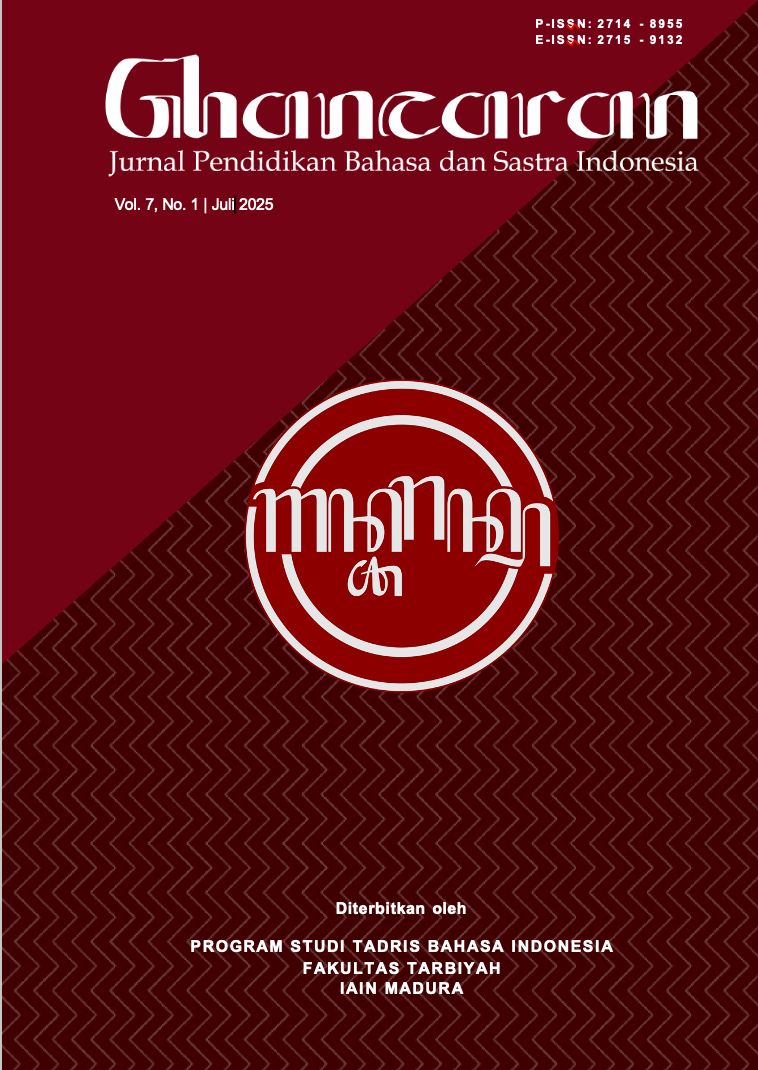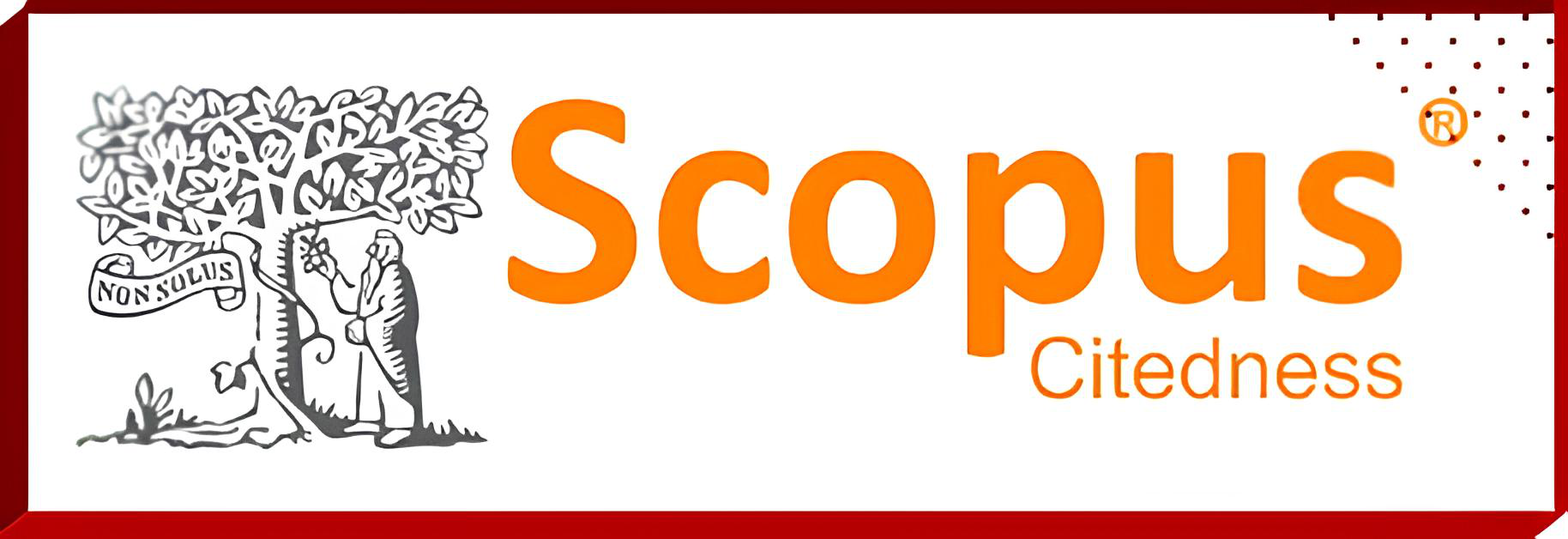Dekonstruksi Nilai Moral Kepemimpinan dan Kesetiaan Rama dalam Novel Sinta Obong Karya Ardian Kresna: Teori Jacques Derrid
 Abstract views: 392
,
Abstract views: 392
,
 PDF downloads: 359
PDF downloads: 359
Abstract
The nature and attitude of a wise leader is sometimes not in line with its implementation. Knights with leadership morals and loyalty that should be a good reflection of the people can be the opposite. The focus of this research is the analysis of the novel Sinta Obong by Ardian Kresna by utilizing Jacques Derrida's deconstruction theory. In contrast to ordinary reading that seeks the true meaning of the text, deconstructive reading focuses on discovering the ignorance or failure of the text in closing itself with a single meaning or truth. The method used is descriptive qualitative. Data collection techniques with library techniques, reading, and note taking. The results showed data in the form of Rama Wijaya's traits that contradict the soul of a wise leader and a loyal partner, (1) narcissism, (2) selfish and stubborn, (3) closing the right to speak, (4) naive and unstable, (5) tarnishing loyalty, and (6) arrogant and cruel. From these traits, it can be seen that Rama Wijaya is still far from the noble nature of a knight.
Downloads
References
Afdholy, N. (2019). Dekonstruksi Makna Jihad dalam Novel Laskar Mawar Karya Barbara Victor. Lingua Franca: Jurnal Bahasa, Sastra, dan Pengajarannya, 3(1), 24–51.
Altiria, S. (2023). Dekonstruksi Derrida pada Kajian Linguistik Kognitif. Konferensi Linguistik Tahunan Atma Jaya (KOLITA), 270–280.
Anggito, A., & Johan, S. (2018). Metodologi Penelitian Kualitatif. Sukabumi: Jejak Publisher.
Arfiyani, G. (2023). Hubungan Kepercayaan (Trust) dengan Kepuasan Hubungan Romantis pada Emerging Adulthood yang Berpacaran di Yogyakarta. Tesis Tidak Diterbitkan. Universitas Negeri Yogyakarta.
Bagis, F., Darmawan, A., Hidayah, A., & Ikhsani, M. M. (2020). The Influence of Leadership Style and Organizational Culture by Mediating Job Satisfaction on Organizational Commitment Case Study in Employees of Islamic Education Institution. Jurnal Ilmiah Ekonomi Islam, 6(3), 616–620.
Derrida, J. (1976). Of Grammatology. Baltimore: The John Hopkins University Press.
Hariyanto, P. (2023). Representasi Sifat Manusia dalam Tokoh Cerita Ramayana. Sirok Bastra, 11(1), 63–76.
Hasanah, M., & Adawiyah, R. (2021). Diferensiasi Konsep Perempuan Tiga Zaman: Kajian Dekonstruksi Jacques Derrida. Litera, 20(1), 1–28.
Kothari, C. R. (2004). Research Methodology: Methods and Techniques (2nd ed.). New Delhi: New Age International.
Kresna, A. (2012). Sinta Obong. Yogyakarta: Diva Press.
Mattayang, B. (2019). Tipe dan Gaya Kepemimpinan: Suatu Tinjauan Teoritis. JEMMA: Journal of Economic, Management and Accounting, 2(2), 45–52.
Maulida, N. A. (2023). The Deconstruction in the Short Story Jimat Sero By Eka Kurniawan. Jurnal Kawruh Abiyasa, 3(1), 25–34.
Miles, M. B., & Huberman, A. M. (1994). Qualitative Data Analysis: An Expanded Sourcebook. America: Sage Publications.
Nana, H., Hairina, Y., & Imadduddin, I. (2021). Hubungan Antara Self Disclosure dengan Trust pada Suami dan Istri dalam Hubungan Pernikahan di Kota Banjarmasin. Jurnal Al-Husna, 2(2), 147–163.
Norris, C. (2006). Membongkar Teori Dekonstruksi Jacques Derrida. Yogyakarta: Ar-Ruzz Media.
Nugraha, F. I., Saraswati, E., & Widodo, J. (2020). Dekonstruksi Jacques Derrida dalam Novel O Karya Eka Kurniawan. Jurnal Ilmiah FONEMA: Jurnal Edukasi Bahasa dan Sastra Indonesia, 3(1), 27–42.
Nurgiyantoro, B. (2017). Teori Pengkajian Fiksi. Yogyakarta: Gadjah Mada University Press.
Ratna, N. Kutha. (2015). Teori, Metode, dan Teknik Penelitian Sastra. Yogyakarta: Pustaka Pelajar.
Robbins S. P., & Jugde. T. A. (2007). Organizational behavior (12th ed.). Upper Saddle River, NJ: Pearson Prentice Hall.
Rukajat, A. (2018). Pendekatan Penelitian Kualitatif (Qualitative Research Approach). Yogyakarta: Deepublish.
Rusli, Y. M., Cristy, A., & Ketty, K. (2023). Pengaruh Kepemimpinan Melayani, Kepemimpinan Religiusitas, dan Etos Kerja terhadap Kineja Organisasi yang Dimoderasi Budaya Organisasi. Primanomics: Jurnal Ekonomi & Bisnis, 21(3), 203–216.
Saputra, A. W. (2022). Dekonstruksi Nilai Hidup Pastor Orang-orang Oetimu. Jurnal Bebasan, 9(2), 1–17.
Semi, M. A. (2021). Metode Penelitian Sastra. Bandung: Angkasa.
Setiyoningsih, T., Sumarwati, & Andayani. (2024). Dekonstruksi Tokoh Rahwana dalam Cerpen Namamu Rahwana karya Artie Ahmad. UMP PRESS: Prosiding Pertemuan Ilmiah Bahasa dan Sastra Indonesia.
Spivak, G. C. (2023). Can the Subaltern Speak?. In Imperialism. London: Routledge.
Strauss, A., & Corbin, J. (1998). Basics of Qualitative Research: Techniques and Procedures for Developing Grounded Theory. Thousand Oaks, California: Sage Publications, Inc.
Suadnyana, I. B. P. E., & Darmawan, I. P. A. (2020). Nilai Pendidikan Agama Hindu dalam Lontar Siwa Sasana. Cetta: Jurnal Ilmu Pendidikan, 3(2), 371–391, 3(2), 371–391.
Sunarso, D. B. (2023). Teori Kepemimpinan. Yogyakarta: CV. Madani Berkah Abadi.
Tamam, B. (2023). Perayaan Tahun Baru Masehi: Tinjauan Hermeneutika Dekonstruksi Jacques Derrida. KOLONI, 2(4), 35–46.
Widijanto, T. (2023). Dekonstruksi Mitos Wayang Ramayana dan Barata Yuda dan Nilai-Nilai Pendidikan Karakter dalam Novel Kitab Omong Kosong Karya Seno Gumira Ajidarma dan Perang Karya Putu Wijaya. Paramasastra: Jurnal Ilmiah Bahasa Sastra dan Pembelajarannya, 10(1), 93–112.
Copyright (c) 2025 GHANCARAN: Jurnal Pendidikan Bahasa dan Sastra Indonesia

This work is licensed under a Creative Commons Attribution-ShareAlike 4.0 International License.
Ghancaran: Jurnal Pendidikan Bahasa dan Sastra Indonesia uses an Open Access Policy under the Creative Commons Attribution-ShareAlike 4.0 International License. Authors publishing in this journal agree to the following terms:
- Ghancaran Journal holds the copyright and grants the journal rights for first publication with the work simultaneously licensed under a

The work is distributed under Creative Commons Attribution-ShareAlike 4.0 International License which allows others to share, copy, and redistribute the material in any media or format and adapt, remix, change, and develop the material even for commercial purposes, as long as it is stated credit and license derivative works under similar terms. - Authors may make additional contractual arrangements for non-exclusive distribution of the journal's published work version.
- Authors are permitted to post their work online (e.g., in institutional repositories or on their websites) before and during submission, as doing so may lead to productive exchange.



















